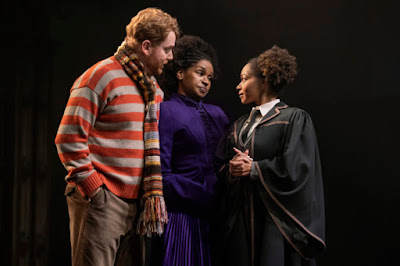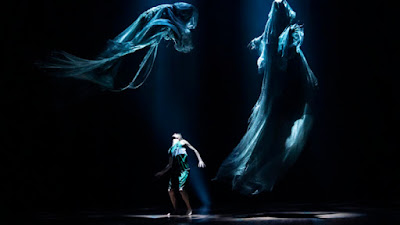Review of the Sunday, May 18, 2025 preview performance at Center Stage in Baltimore, Maryland. Starring Ben Ahlers, Jordan Boatman, Sam Huntsman, Ked Merwin, Adrienne C. Moore and Robbie Tann. A new play by Matthew Weiner. Scenic design by Beowulf Boritt. Costume design by Orla Long. Lighting design by Xiangfi Xiao. Projection design by Stefania Bulbarella. Sound design/Composer Taylor J. Williams. Fight and intimacy choreography by Sierra Young. Directed by Stevie Walker-Webb. 110 minutes, with no intermission.
Early on in John Wilkes Booth: One Night Only, Booth admonishes us for not knowing his full, true story - that he's much more than that one bullet. And it is true. I learned quite a bit about one of America's most infamous villains; knowing so little is even more egregious given that he is from my home state of Maryland. To that end, this play by nine-time Emmy Award winner Matthew Weiner (TV's Mad Men and The Sopranos), is a dramatic prequel of sorts to Sondheim's Assassins. Unfortunately, it was in spite of the play rather than because of it that I learned a lot.
Set up as a cabaret one-man show, it has enough meta twists and turns to be clever enough. (Oh, Mary!'s Mary Todd Lincoln would have been thrilled to share the stage with ol' Jack Booth, I'm sure.) But the constant breaking of the fourth wall - things like direct address, an inept prompter, and stopping to repeat "important lines" grows old fast, both because any momentum the play gathers is stopped cold, and because it's a dramatic device that has become trite and here covers no new ground. Instead of adding to it, the conceit only serves to lengthen an already overlong intermission-less event.
Tony nominee Stevie Walker-Webb (Ain't No Mo') directed this mess, though to be fair, we saw an early preview and one hopes he used the rest of the pre-opening time to tighten the piece and work with the playwright to finesse this world premiere script. Beowulf Boritt designed the 19th century stage setting that does everything it needs to, along with a late act surprise that caused a deserved gasp. Lit with an appropriate dramatic flare by Xiangfi Xiao, and costumed with wit by Orla Long, the production is handsome enough to look at. At one point, "Booth" employs a "magic lantern" (a slide show) to supplement his lecture, but, as designed by Stephania Bulbarella, its effectiveness is mixed. One sequence, the re-telling of the execution of John Brown through clever, stylized silhouettes was really cool. The rest, a hodgepodge of images less 18th century and more Google search top picks, was more distracting than anything else.


The six cast members do the best they can with the dense, meandering script that calls on them to do 18th century melodrama-style acting, mixed with an inordinate amount of Shakespeare, and finally, a jarring dose of realism. Some are more successful than others. Perhaps it is by design (and that would be a big benefit of the doubt) that the three actors who play generic theatrical types are the least successful. As "Actress," Adrienne C. Moore fails to make her formidable presence work with a series of accents so thick that her lines are nearly all unintelligible. Similarly, Ked Merwin milks his awkward nerdy-ness dry, losing much of his early audience good will with an uneven vocal affectation and a one-note take on a beleaguered prompter. Finally, and it gives me no pleasure to say this, there's "The Boy," a virtually unnecessary character, played by Sam Huntsman, who makes so little impression it is difficult to say who is most at fault, the actor or the playwright.


The good news - and it is very good - is that the three main actors are always exciting and offer the strongest argument that this work is worthy of future work and production. First, as Booth's sister Asia Booth Clarke (and other characters) Jordan Boatman is a magnetic presence, with a strength that draws the eye and captivates thoroughly. Next up, as Booth's brother Edwin (and father at one point) Robbie Tann embodies the exact tone and flair I think Weiner is going for. Tann's hairpin switches between self-absorbed "actor" and expert Shakespeare tragedian are truly remarkable. One expects this guy to make it big and soon.
Most importantly, John Wilkes Booth is being played by another actor that seems to fully understand the assignment here. Ben Ahlers, probably most famous for his role in HBO's The Gilded Age, goes all in with the character, managing to be both a chilling sociopath, and, dare I say it, sympathetic. Grand gestures and minute ticks go hand in hand in this portrayal. With a pleasing combination of boyish charm and suave roguishness, he struts and frets about the stage. Until he doesn't. The final moments of the play - Booth in Garrett's barn being smoked out - signal a stark, abrupt change, and Ahlers is perfect at convincingly making that scary shift believable. In lesser hands, this would simply not have worked. It was a pleasure watching him work live in front of me.
A work that has potential, One Night Only suffers under the weight of its own concept. A tighter script, a more focused direction and a few recasts could make this go places. For now though, I'll think of the entire Booth family every time I walk by the Booth Theatre on 45th Street. Edwin (its namesake) and John Wilkes deserve our attention.
📸: Baltimore Center Stage
📸: Baltimore Center Stage














































